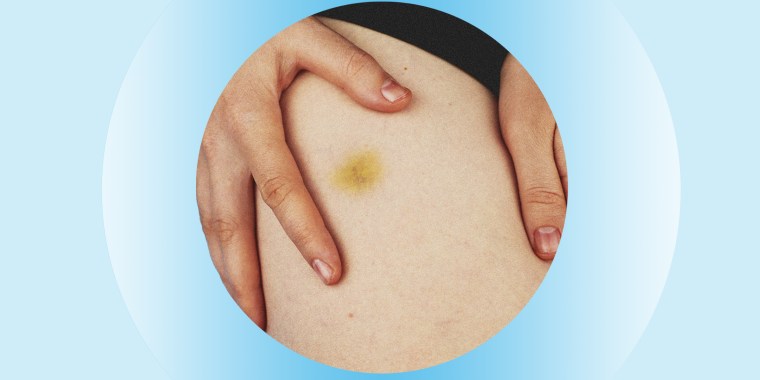Do you ever feel like the main character in Hans Christian Andersen's fairy tale "The Princess and the Pea," in which the delicate princess wakes up “black and blue all over” after sleeping on a single pea covered by a tower of mattresses?
Your skin can reveal many clues about your health, so a tendency to bruise easily might make you worry.
Although finding frequent bruises can sometimes signal health problems, doctors say most cases are nothing to worry about.
Dr. Monique Tello, a primary care physician at Massachusetts General Hospital, encounters patients with “easy bruising anxiety” quite frequently.
“Thus far, in my ten years as an attending (physician), no one in my primary care practice has had any serious underlying condition,” Tello told TODAY. “Usually, they didn’t remember some bump, or were taking aspirin. Rarely, bruising can be a clue that there is a medical issue.”
Most bruises happen when you suffer an injury that fails to break the skin, but crushes the small blood vessels underneath. Blood then leaks and becomes trapped under the surface, leaving the telltale mark.
If you work out a lot, you might notice random bruising on your legs, primarily in fatty areas that are exposed, like your thighs or buttocks, said Dr. Abigail Waldman, a dermatologist at Brigham and Women’s Hospital.
Here are other possible causes of easy bruising:
Blood thinners
Besides injury, blood thinners — medications or supplements that slow down or decrease your blood's clotting ability — may be the number one cause for easy bruising, Waldman said. They’re very common, ranging from aspirin to drugs like Coumadin. If you’re on blood thinners, it may take longer for bleeding to stop, leading to bigger bruises.
You might not even realize you’re taking something that thins your blood: Fish oil supplements, ginkgo biloba, alcohol and garlic have similar effects.
Other drugs
Steroids can lead to thinner skin, so you may notice bruising with just slight trauma. Chemotherapy can lower the number of platelets — the cells that help your blood to clot — in your body, the National Cancer Institute notes. A low platelet count means a higher risk of bruising.
Vitamin deficiency
Easy bruising might suggest you lack enough vitamin K, found in leafy green vegetables, broccoli and Brussels sprouts. Most people get enough of this fat-soluble vitamin in their diets, so you don’t need to take a supplement, Waldman said. But if you are deficient, it’s a sign you may not be absorbing vitamins correctly, she added. That may include people with Crohn’s disease or ulcerative colitis.
A severe lack of vitamin C — or scurvy — could also be the culprit because the vitamin is involved in building the walls of blood vessels, Waldman said. Scurvy is rare in the U.S. — symptoms include bleeding around hair follicles and bleeding gums.
Aging
As you age, your blood vessels become more fragile. “You can think of it like a hose that holds the blood,” Waldman said. “As you get older, you sort of have some leaks in the hose. So very small injuries can cause that area to open up and leak blood out into the skin, causing a bruise.”
Older skin is more fragile, too, and there’s less fat underneath it, leaving you with less cushion if you bump into something. All of those factors can lead to senile purpura, or bruises that show up after very slight injury in elderly people. The marks typically appear in areas that have had significant sun exposure, like the arms and the hands, Waldman said
“Unfortunately, there’s not a lot you can do to prevent it, except to try to avoid any even minimal injury. But sometimes it’s nice for patients just to have a diagnosis,” she added.
Cancer
In rare cases, easy bruising can be a sign of blood, bone marrow or lymph node cancers, Waldman said. These marks often show up as petechiae — very small red dots from bleeding under the skin — but can look like large bruises as well.
The bruises can be one clue of many, so doctors will ask about any accompanying bleeding from the gums, fevers, chills, night sweats, bone pain, Tello said.
“In my years of training, I rotated through oncology and ICU units where patients had had easy bruising as one of many signs of their underlying leukemia or bleeding disorder diagnosis originally,” she noted.
Liver disease
The liver’s many functions include producing clotting factors. When the organ is damaged and slows or stops producing the proteins needed for blood clotting, you will bruise or bleed easily, according to the National Institute of Diabetes and Digestive and Kidney Diseases.
Genetic factors
The tendency to bruise easily can run in families. Genetic causes can lead to changes in your platelet count or the factors that are involved in clotting.
See a doctor if you have:
- Significant pain and swelling. That could represent a larger bleed under the skin, especially if you’ve had a significant fall or injury, Waldman said.
- A bruise that lasts longer than two weeks without changing. It may not be a bruise at all or be caused by an underlying problem.
- Small blood spots accompanied by fever, chills, weight loss or any other systemic symptoms that are new.
- Recurrent bruises without any clear causes.
There’s no one true definition of being an “easy bruiser,” but Waldman defines it as bruising with minimal or no injury. In most cases, bruises are not a cause for worry.
Putting ice on a bruise can help minimize swelling and some data suggests taking arnica orally can help prevent bruising, she noted. Your body will clear most bruises within a week.



